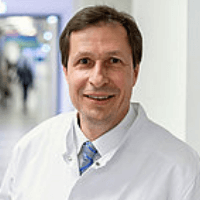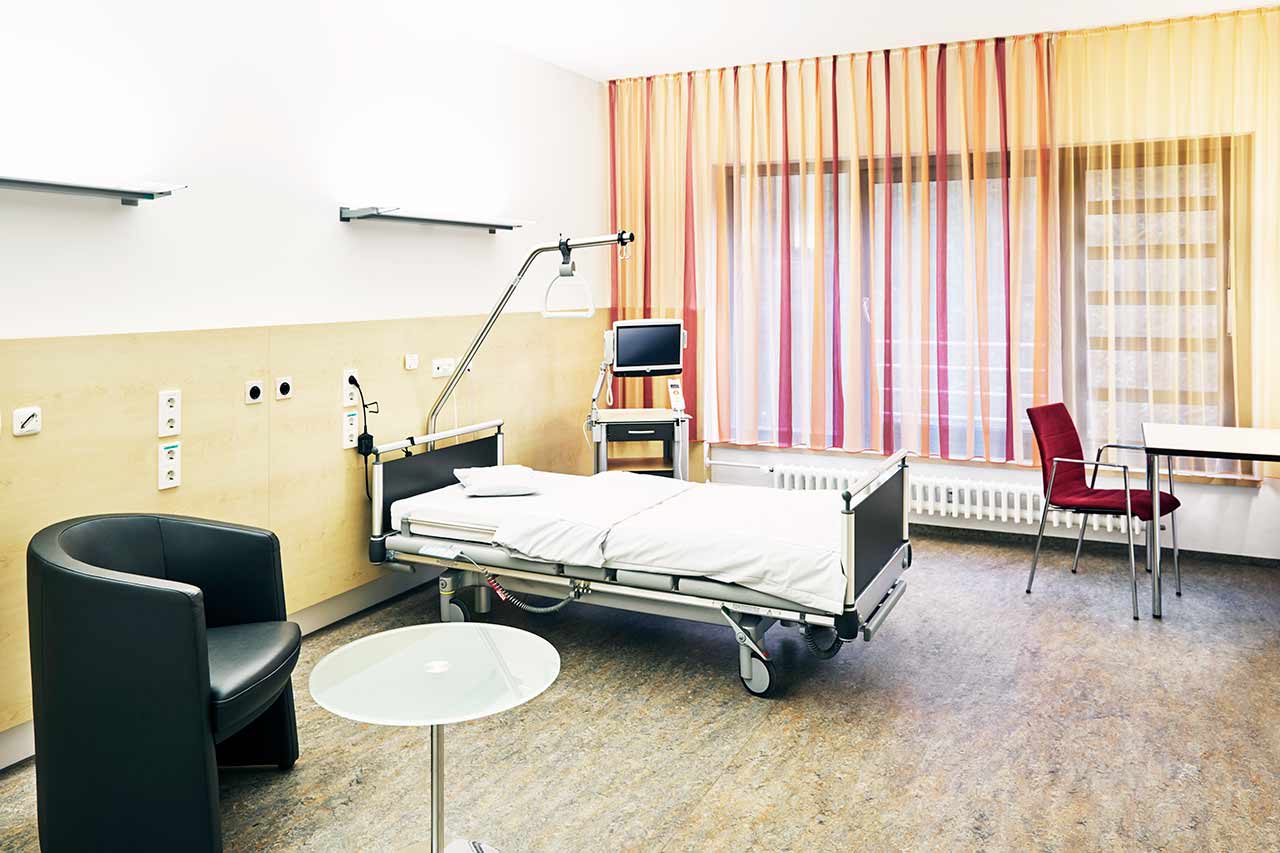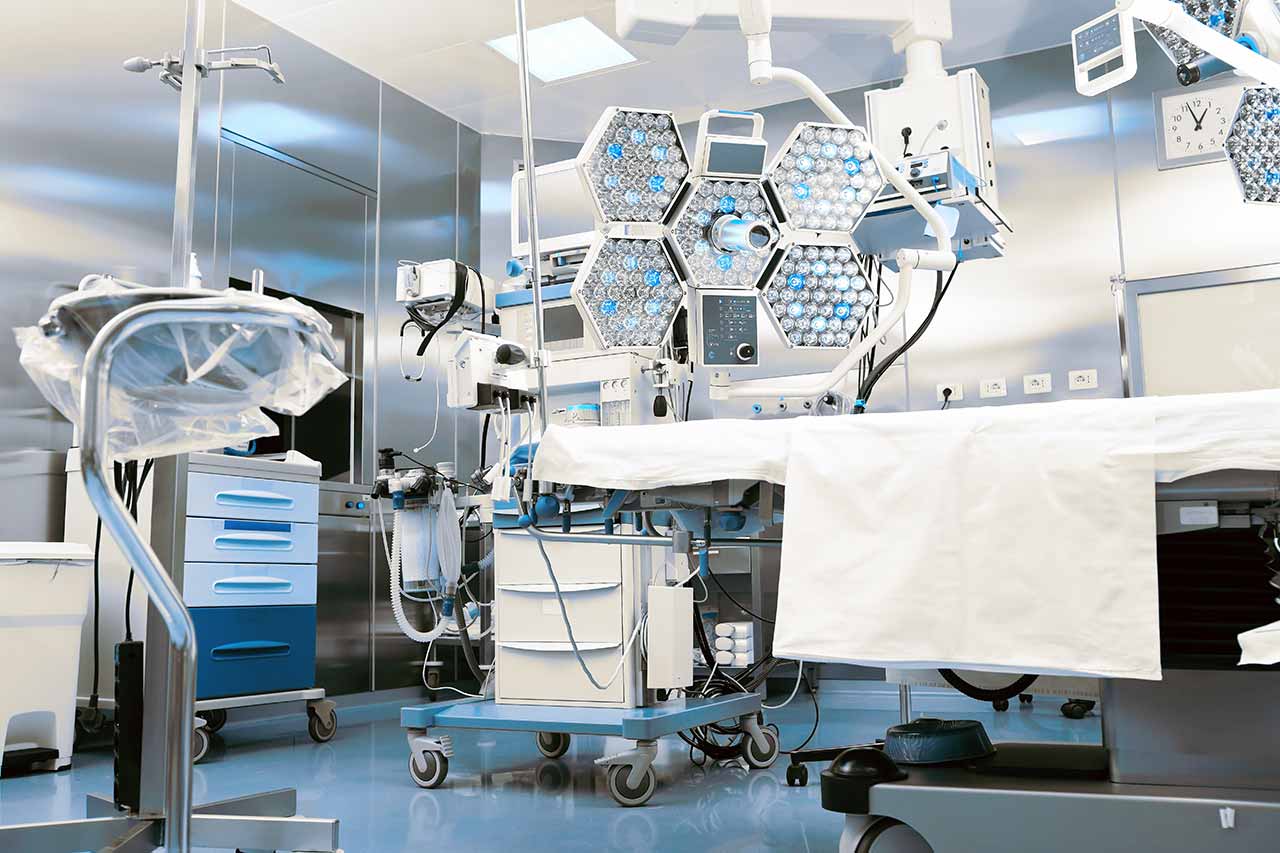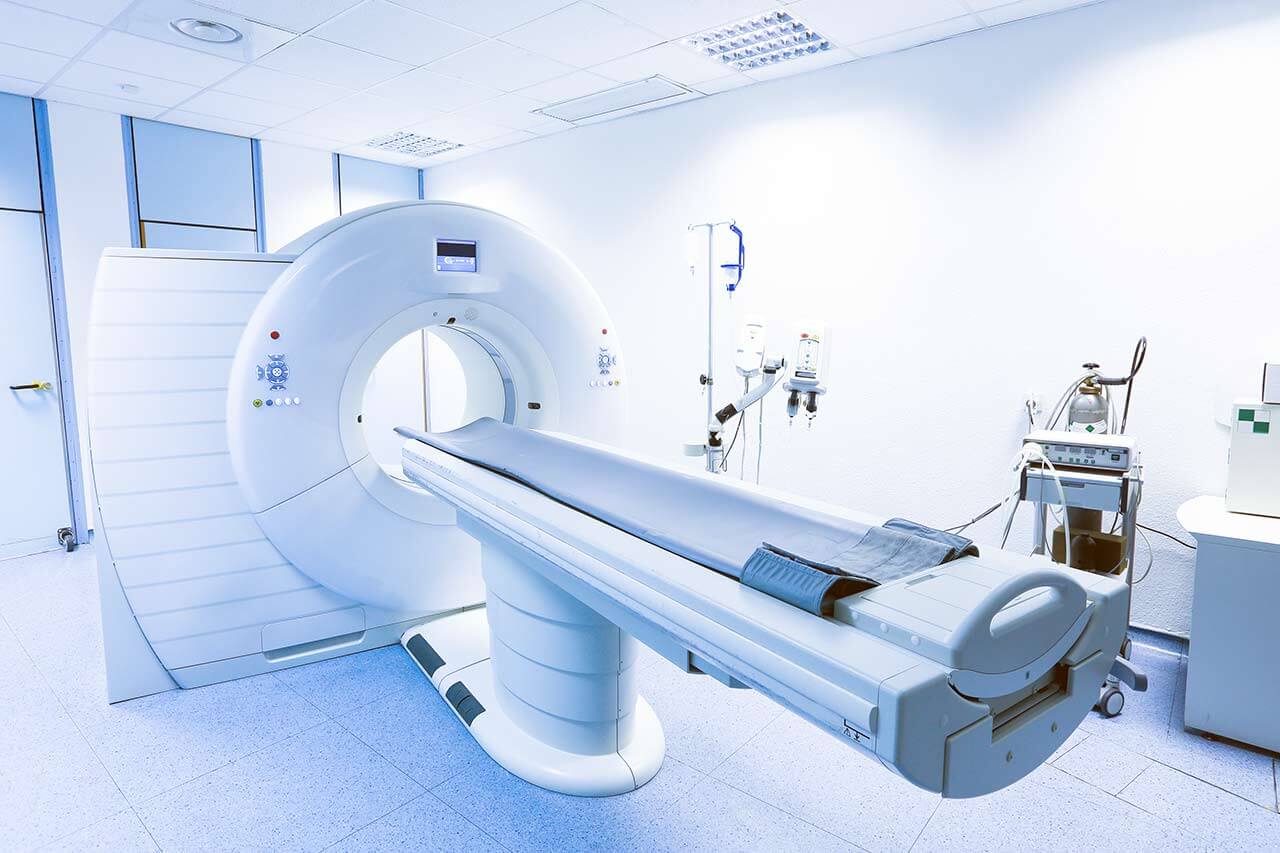
The program includes:
- Initial presentation in the clinic
- clinical history taking
- physical examination
- orthopedical examination
- X-ray of hip joint
- MRI scan of hip joint (on indication 1200 €)
- nursing services
- consultation of all leading experts
- development of individual treatment plan
Required documents
- X-ray examination of the hip joints
- MRI scan of the hip joints, if available
Service
You may also book:
 BookingHealth Price from:
BookingHealth Price from:
About the department
The Department of Trauma Surgery, Orthopedic Surgery and Foot Surgery at the Hospital Kassel offers the full range of modern diagnostic tests for the detection of musculoskeletal diseases, as well as many effective treatment methods for their elimination. Moreover, the department enjoys the status of the Center of Excellence for Trauma Surgery, so trauma surgeons working in the medical facility have a rich and unique experience in the treatment of patients after both simple common and especially complex injuries, including traumatic brain injuries, spinal injuries, polytrauma, injuries of the internal organs, etc. In addition to the treatment of injuries, a special focus is on arthroscopic interventions, joint replacement surgery, interventions to treat foot diseases and deformities, as well as surgery to resect soft tissue tumors. The surgical treatment is provided in the high-tech operating rooms with advanced surgical instruments and computerized systems for the most effective interventions with minimal damage to the healthy adjacent tissues. The department is headed by Prof. Dr. med. Clemens Dumont.
Thanks to the availability of modern technical equipment in the department, many joint surgeries can be performed using arthroscopic techniques. As a rule, arthroscopic interventions are outpatient and a patient can return home the same day after surgery. The main surgical instrument during such interventions is an arthroscope – a tool with a hollow tube several millimeters in diameter; it is equipped with a light source, an optical system or a tiny video camera, which transmits a multiply zoomed image of the joint cavity on a large screen. When performing the arthroscopic procedure, the surgeon makes two skin incisions: one for inserting the arthroscope, and the other one for inserting miniature endoscopic surgical instruments into the joint cavity. Prior to the operation, the surgeon fills the joint cavity with saline, which remains there throughout the surgical procedure. Due to this solution, the joint cavity expands. The main advantage of such interventions is the speedy postoperative recovery of the patient, which takes only 1-3 weeks, which is much less than after classical open surgery. At the same time, arthroscopic interventions are not inferior to open surgeries in terms of their efficiency and give excellent results even in the case of severe joint injuries. The department's orthopedic surgeons specialize in arthroscopic knee, hip, shoulder, elbow and ankle surgery.
An important place in the department's clinical practice is given to the joint replacement surgery – knee, hip, shoulder, elbow and ankle. The competence of the department's doctors covers both partial and total replacement surgeries, as well as revision replacement surgery. Whenever possible, joint replacement is performed using minimally invasive surgical techniques. To ensure the most accurate positioning of the prosthesis during operations, modern navigation systems are used. The joints are replaced using only high-quality prostheses from leading world manufacturers. They are characterized by high reliability and long service life.
The department's specialists admit patients with spinal diseases and injuries. As the Center of Excellence for Trauma Surgery, the department provides the effective treatment of spinal injuries of any severity – from osteoporotic fractures of the vertebral bodies to acute transverse injuries of the entire spine. The department's medical team also specializes in the treatment of spinal tumors (in cooperation with the Department of Oncology). Many operations are performed using minimally invasive techniques, which greatly simplifies the patient's recovery after surgical treatment. The advanced computer navigation systems allow the doctors to perform surgical procedures with millimeter accuracy, avoiding damage to the vital anatomical structures of the spine.
The department's range of medical services includes:
- Diagnostics and treatment of injuries, including limb amputation (certified Center of Excellence for Trauma Surgery)
- Abdominal injuries
- Pelvic ring injuries
- Thoracic injuries
- Clavicle injuries
- Ankle and calcaneal injuries
- Chemical, thermal or burn injuries
- Elbow injuries
- Hip injuries
- Knee injury
- Shoulder injury
- Tarsal injuries
- Forearm injuries
- Wrist injuries
- Hand and finger injuries
- Heart injuries
- Injuries of several tubular bones
- Muscle injuries (compression syndromes)
- Nerve injuries
- Vascular and arterial injuries
- Paired and multiple limb injuries
- Polytrauma, sepsis, organ failure
- Traumatic brain injuries
- Soft tissue injuries
- Spinal injuries
- Sports injuries
- Shoulder instability
- Rotator cuff tear
- Dislocated shoulder
- Tennis elbow
- Golfer's elbow
- Meniscus injuries
- Cruciate ligament rupture and lateral ligament injuries
- Patellar dislocation
- Patellar fracture
- Hamstring and patellar tendon rupture
- Ligament injuries
- Achilles tendon rupture
- Diagnostics and treatment of orthopedic diseases
- Arthroscopic surgery
- Knee arthroscopic surgery
- Cartilage replacement surgery (cartilage cell transplantation, microfracturing, bone and cartilage graft transplantation)
- Anterior/posterior cruciate ligament replacement
- Meniscus repair (suturing, partial resection)
- Patellar dislocation repair
- Shoulder arthroscopic surgery
- Rotator cuff repair
- Shoulder dislocation stabilisation surgery
- Impingement syndrome surgery
- Shoulder dislocation surgery
- Frozen shoulder surgery
- Shoulder stiffness surgery
- Ankle arthroscopic surgery
- Cartilage replacement surgery, microfracturing, bone and cartilage graft transplantation
- Impingement syndrome surgery
- Osteochondritis dissecans surgery
- Hip arthroscopic surgery
- Operations for impingement syndrome
- Surgery for damage to cartilage tissue (microfracturing)
- Osteochondritis dissecans surgery
- Arthroscopic interventions on the elbow joint
- Knee arthroscopic surgery
- Knee, hip, shoulder, elbow and ankle replacement surgery
- Partial replacement surgery
- Total replacement surgery
- Revision replacement surgery
- Foot surgery
- Foot fractures
- Hallux valgus
- Hallux rigidus
- Hammer and claw toes
- Clubfoot
- Metatarsalgia
- Flat feet
- Foot arthrosis
- Heel spur
- Morton's neuroma
- Tarsal tunnel syndrome
- Charcot foot
- Chronic ankle instability
- Osteochondritis dissecans
- Spinal surgery
- Spinal injuries and fractures
- Degenerative diseases
- Inflammatory and infectious spinal diseases
- Spinal tumors and metastases
- Pathological spinal changes caused by osteoporosis
- Soft tissue tumor surgery
- Arthroscopic surgery
- Other medical services
Curriculum vitae
Since January 2015, Prof. Dr. med. Clemens Dumont has been heading the Department of Trauma Surgery, Orthopedic Surgery and Foot Surgery at the Hospital Kassel. For over 11 years, Prof. Dumont held the position of Senior Physician, and for the last four years of a Senior Physician with management responsibilities in the Department of Traumatology, Plastic and Reconstructive Surgery at the University Hospital Göttingen. The specialist received his medical education at the Faculty of Medicine of the University of Duesseldorf, where he also defended his doctoral thesis in medicine. This was followed by specialized training in Surgery, Orthopedics and Trauma Surgery at the hospitals in Moers, Duisburg and Göttingen. The specialist also received additional qualifications in Special Trauma Surgery, Orthopedics, Emergency Medical Care and Hand Surgery. In 2009, the doctor had his habilitation, and also received a degree at the Technical College in "Management in Medical Facilities". Prof. Dumont was a Member of the Habilitation Committee and the Ethics Committee at the University Hospital Göttingen. He was also responsible for assessing the quality of medical care in the Trauma Network Göttingen-Kassel.
Prof. Clemens Dumont's special clinical focuses include surgery on the joints of the upper and lower limbs, treatment of pelvic injuries, periprosthetic fractures and spinal cord injuries.
Photo of the doctor: (c) Klinikum Kassel
About hospital
The Hospital Kassel is a progressive medical facility with a huge medical team, which provides high-quality medical services in all branches of modern medicine. The hospital is part of the regional medical Gesundheit Nordhessen Holding, which unites 5 top-class medical centers, including specialized rehabilitation clinics. With 1,281 beds, the hospital is known as the largest medical complex in the federal state of Hesse. The hospital has 32 specialized departments with highly qualified doctors and specially trained nursing staff in each department. The team of 3,200 employees takes care of the health of patients. The main value for each employee is the patient's health. The professional skills of the medical staff in combination with state-of-the-art medical and technical equipment of the hospital provide excellent opportunities for the treatment of patients with pathologies of any severity.
The hospital provides treatment to over 55,000 inpatients and about 140,000 outpatients every year. Medical care is provided to both German citizens and many patients from foreign countries. Such high rates are the evidence of excellent quality of medical services and the high credit of patients' trust.
The hospital has created a wonderful atmosphere, which contributes to the rapid recovery of patients. All diagnostic and therapeutic rooms, operating rooms, as well as patient rooms are designed taking into account modern standards of European medicine in order to ensure maximum comfort of each patient. All employees working in the hospital provide the patient with understanding and respect, as well as support him in every possible way during the entire therapeutic process.
The hospital successfully implements a quality management system. It uses its own quality management system implemented by the medical Gesundheit Nordhessen Holding, as well as the IQM (Initiative Qualitätsmedizin) monitoring system. As part of healthcare quality management, the hospital annually clearly provides reports on its clinical activities, the success of diagnostics, treatment, level of patient care, etc. Thus, the hospital stands for maximum openness in its work and makes every effort to maintain the highest level of quality of medical care.
Photo: (с) depositphotos
Accommodation in hospital
Patients rooms
The patients of the Hospital Kassel live in comfortable single, double and triple rooms. The patient rooms are made in a modern design and pastel colors. A standard patient room includes an automatically adjustable bed, a bedside table, a wardrobe, a table and chairs for receiving visitors, a TV and a telephone. The patient rooms have Wi-Fi. Each room has an ensuite bathroom with shower and toilet.
The hospital also offers enhanced-comfort patient rooms. Most of these rooms have a balcony. The bathroom additionally includes a hairdryer, towels and toiletries.
Meals and Menus
The patient and the accompanying person are offered tasty and balanced three meals a day. If for some reason you do not eat all foods, you will be offered an individual menu. Please inform the medical staff about your food preferences prior to treatment. The patients staying in enhanced-comfort rooms are provided with an individual menu every day.
The hospital also has several cafes where one can have a cup of tea or coffee, taste delicious pastries, salads, main hot dishes, pizza, etc.
Further details
Standard rooms include:
Religion
The religious services are available upon request.
Accompanying person
During the inpatient program, the accompanying person can live with the patient in a patient room or a hotel of his choice. Our managers will help you choose the most suitable option.
Hotel
During an outpatient program, the patient can stay at the hotel of his choice. Our managers will help you choose the most suitable option.





